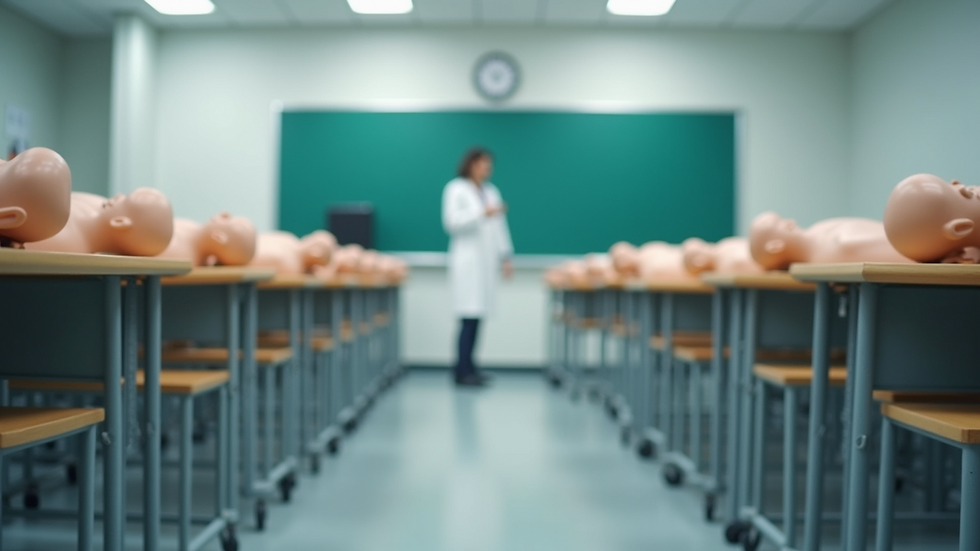First Aid Classes | Many U.S. Latinos Aren’t Familiar with Lifesaving Device
- oliver591
- May 2, 2022
- 2 min read

ANAHEIM, California — One in four U.S. Latinos have never heard of a portable device available in many public places that can help save someone whose heart has stopped, new research shows.
That’s compared to 4 percent of whites who were unfamiliar with automated external defibrillators, or AEDs, which shock the heart back to a normal rhythm.
The findings were released Saturday at the American Heart Association’s Scientific Sessions.
Because AEDs can be a critical tool to help people survive a cardiac arrest, the results underscore an urgent need to educate Latinos, said study researcher Benjamin S. Abella, M.D., an emergency medicine physician at the Hospital of the University of Pennsylvania in Philadelphia.
Knowing how to use an AED is “an important part of what it is to be an informed and enabled citizen to respond to emergencies,” said Abella, director of the university’s Center for Resuscitation Science.
Abella and his colleagues analyzed responses from 9,022 Americans who participated in a telephone survey between September and November 2015. One in 10 respondents were Latino, and most chose to answer the survey in English.
In the United States, more than 350,000 Americans have a sudden cardiac arrest outside a hospital every year, according to AHA statistics. About one in five occur in public settings such as airports, restaurants and shopping centers.
Research shows performing CPR and quickly using an AED increases the chances of survival for people having a cardiac arrest.
Graham Nichol, M.D., a longtime emergency medicine physician in Seattle, said government agencies, nonprofits and community organizations, such as state health departments, churches and immigrant advocacy groups, should work together to start CPR training and AED educational programs in neighborhoods where people are less likely to survive cardiac arrest.
Campaigns that consider cultural, educational and income characteristics of such communities have the potential to “improve overall health,” said Nichol, a professor of medicine at the University of Washington who was not involved in the new study.
Abella said the next step is to delve deeper into the data they’ve collected to understand why Latinos are less likely to know what an AED is — and who is qualified to use it. Only 19 percent of Latinos said anybody could use an AED, compared with 30 percent of whites, 22 percent of blacks and 22 percent of Asians.
Learn, Enjoy and Save Life. HealthForce Training Center offer services such as Basic Life Support (BLS), Advance Cardiovascular Life Support (ACLS), Pediatric Advance Life Support (PALS), CPR AED, Pediatric First Aid CPR AED and First Aid CPR AED. Read more of our blogs.
Source(s):





789bet đã trở thành thương hiệu quen thuộc trong giới cá cược trực tuyến. Đến với 789bethp com, người chơi được tận hưởng dịch vụ đỉnh cao, hệ thống xanh chín và khuyến mãi cực lớn.
F8bet trang chủ mang đến trải nghiệm cá cược trực tuyến đẳng cấp với giao diện hiện đại và dịch vụ chuyên nghiệp. Truy cập ngay f8bet80 one để tham gia nền tảng giải trí hàng đầu châu Á hôm nay!
Trải nghiệm đỉnh cao giải trí tại 78WIN – nhà cái uy tín hàng đầu Châu Á. Click xem ngay link 78winnk net để khám phá kho game bất tận và cơ hội rinh thưởng siêu khủng!
SunWin là lựa chọn số 1 cho người yêu thích game đổi thưởng. Với cộng đồng đông đảo và trả thưởng công bằng, bạn có thể tham gia tại https://sunwin.us.com/
go88 là cổng game trực tuyến hấp dẫn nhất hiện nay, go88 ist nổi bật với chất lượng đồ họa và tính năng vượt trội. Xem ngay cách đăng ký tài khoản và khám phá kho game tại go88.